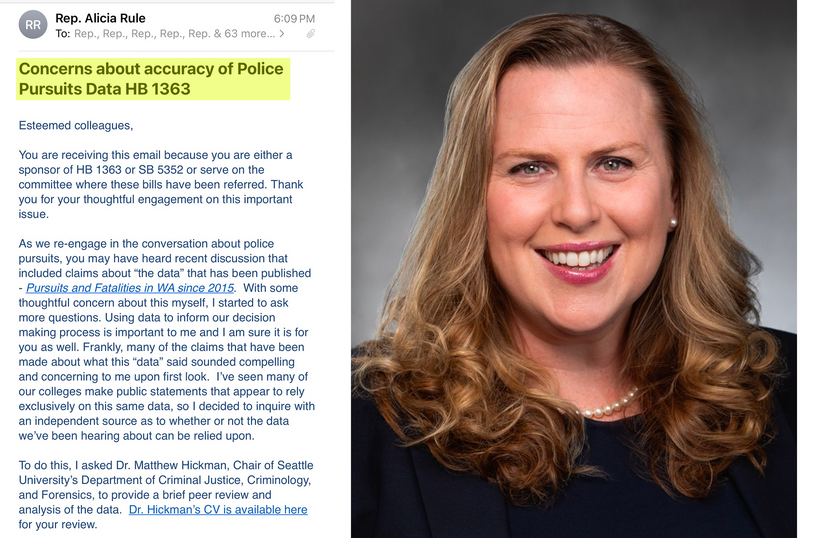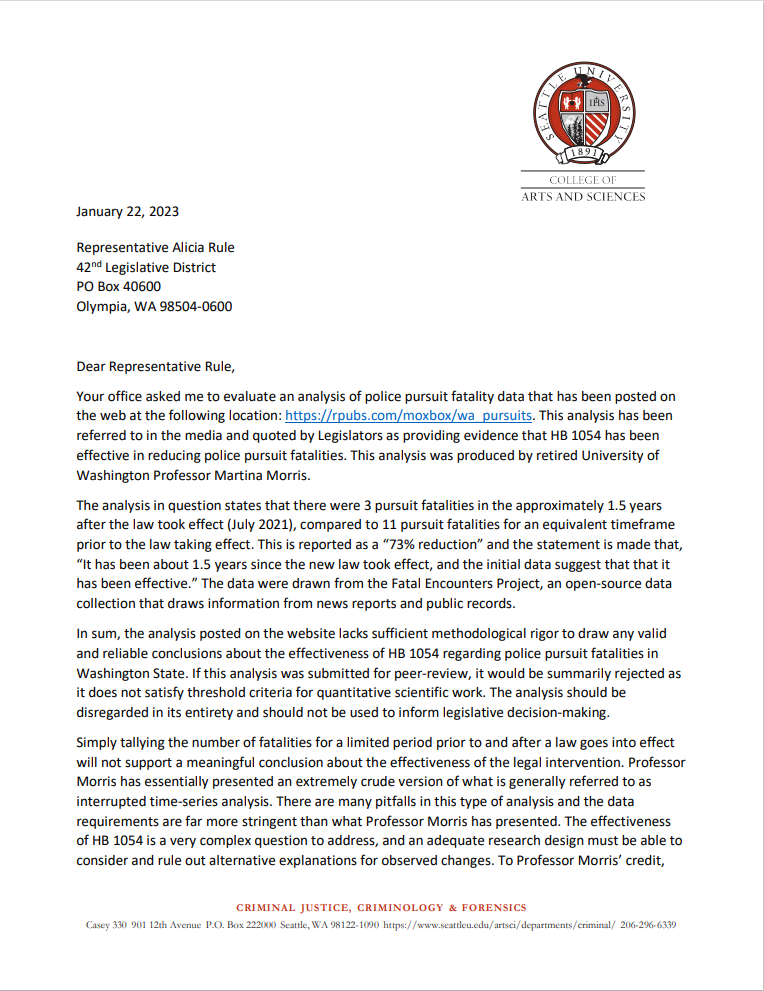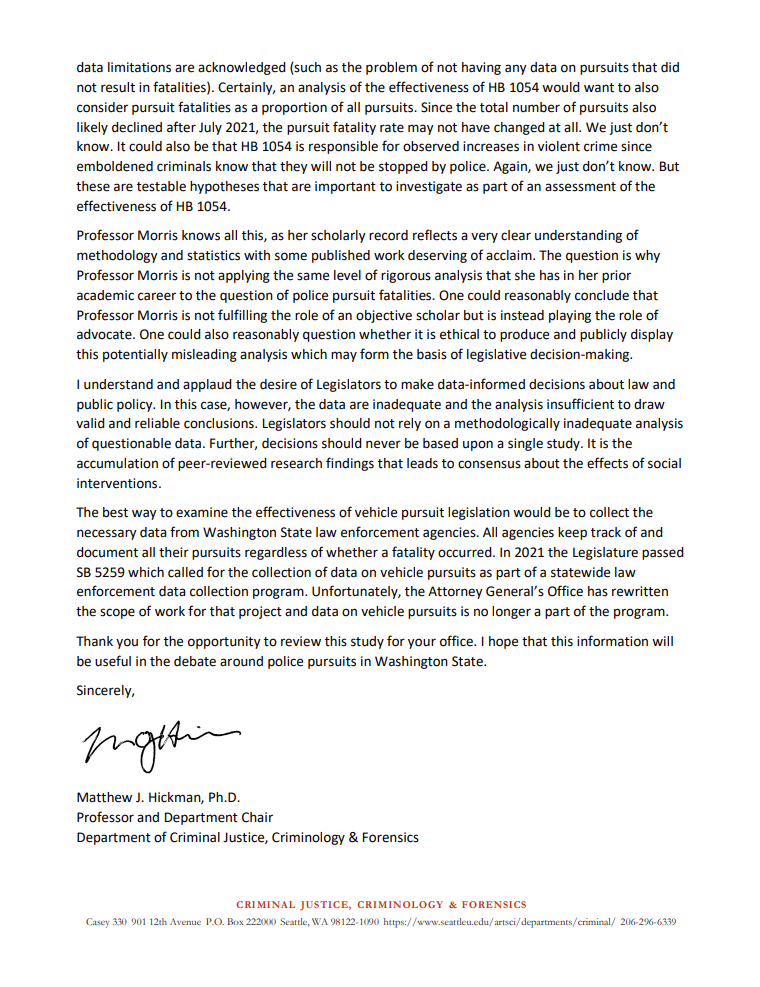Democratic lawmaker, professor debunk data used to restrict police pursuits
This story was originally published on unDivided’s Patreon page. Subscribe here.
Data being used to justify Washington state’s controversial police pursuit restrictions “should be disregarded in its entirety and should not be used to inform legislative decision-making,” concluded an independent review.
The finding comes as State Senator Manka Dhingra (D-Redmond) uses that very data as justification to kill a bipartisan proposal that would loosen restrictions placed on pursuits in 2021. Dhingra, chair of the Senate Law & Justice Committee, has said repeatedly in recent days that “data” proves House Bill 1054 is saving lives by reducing the number of innocent bystanders killed in police pursuits.
“The data that I have seen come in says that the deaths of bystanders have dramatically gone down, so our streets are safer for innocent individuals who are just going about their day,” Senator Dhingra declared during a press conference last week.
Dhingra repeated a similar sentiment on Monday when asked why she would not allow a hearing on the proposed fix for HB 1054.
“There has been a 73% reduction in innocent Washingtonians being killed,” she said.
The “data” Senator Dhingra points to comes from an analysis done by retired University of Washington Professor Martina Morris, who examined deaths associated with vehicle pursuits by law enforcement in Washington state since 2015.
“It has been about 1.5 years since the new law took effect, and the initial data suggest that that it has been effective,” Morris concluded, noting that there have been 3 pursuit-related fatalities since the law took effect in July 2021, compared to 11 over a similar timeframe before the law was changed.
“Since the law change in 2021, the number of people killed during pursuits has dropped by 73%.”
The finding of the report certainly makes House Bill 1054 sound like a resounding success – but at least one Democratic lawmaker is calling bullshit.
In an email obtained by unDivided, State Rep. Alicia Rule (D-Blaine) informed some of her fellow lawmakers, including Senator Dhingra, that she commissioned an independent review to check the validity of Morris’ findings.
Her email, sent on Sunday, reflects deep in-party division about whether HB 1054 has improved public safety.
“As we re-engage in the conversation about police pursuits, you may have heard recent discussion that included claims about ‘the data’ that has been published. With some thoughtful concern about this myself, I started to ask more questions,” Rep. Rule wrote in an email to several dozen lawmakers who are involved in debate over the pursuit law. “Using data to inform our decision-making process is important to me and I am sure it is for you as well. Frankly, many of the claims that have been made about what this ‘data’ said sounded compelling and concerning to me upon first look. I’ve seen many of our colleagues make public statements that appear to rely exclusively on this same data, so I decided to inquire with an independent source as to whether or not the data we’ve been hearing about can be relied upon.”
Rule went on to provide a two-page review written by Professor Matthew J. Hickman, chair of the Department of Criminal Justice, Criminology & Forensics at Seattle University. Hickman has an extensive history in statistical research related to law enforcement, having previously worked as a statistician at the Bureau of Justice Statistics.
In his review, dated January 22, Dr. Hickman blasted the Morris report as “crude” and “lacking methodological rigor.”
“If this analysis was submitted for peer-review, it would be summarily rejected as it does not satisfy threshold criteria for quantitative scientific work,” he wrote. “The analysis should be disregarded in its entirety and should not be used to inform legislative decision-making.”
More from Dr. Hickman’s findings:
Simply tallying the number of fatalities for a limited period prior to and after a law goes into effect will not support a meaningful conclusion about the effectiveness of the legal intervention. Professor Morris has essentially presented an extremely crude version of what is generally referred to as interrupted time-series analysis. There are many pitfalls in this type of analysis and the data requirements are far more stringent than what Professor Morris has presented. The effectiveness of HB 1054 is a very complex question to address, and an adequate research design must be able to consider and rule out alternative explanations for observed changes.
To Professor Morris’ credit, data limitations are acknowledged (such as the problem of not having any data on pursuits that did not result in fatalities). Certainly, an analysis of the effectiveness of HB 1054 would want to also consider pursuit fatalities as a proportion of all pursuits. Since the total number of pursuits also likely declined after July 2021, the pursuit fatality rate may not have changed at all. We just don’t know. It could also be that HB 1054 is responsible for observed increases in violent crime since emboldened criminals know that they will not be stopped by police. Again, we just don’t know. But these are testable hypotheses that are important to investigate as part of an assessment of the effectiveness of HB 1054.
Dr. Hickman goes on to question why Morris would present a report based on such incomplete information – going as far as to question her ethics.
Professor Morris knows all this, as her scholarly record reflects a very clear understanding of methodology and statistics with some published work deserving of acclaim. The question is why Professor Morris is not applying the same level of rigorous analysis that she has in her prior academic career to the question of police pursuit fatalities. One could reasonably conclude that Professor Morris is not fulfilling the role of an objective scholar but is instead playing the role of advocate. One could also reasonably question whether it is ethical to produce and publicly display this potentially misleading analysis which may form the basis of legislative decision-making.
In her email, Rep. Rule told fellow lawmakers that Dr. Hickman’s report should put an end to use of the Morris “data” to justify HB 1054.
“As I read Dr. Hickman’s independent analysis, it appears clear to me that ‘the data’ that we’ve been hearing about as of late, has been debunked,” she wrote. “I look forward to working with each of you to carefully and openly consider reasonable and balance modifications to our state’s vehicular pursuit law.”
Senator Dhingra did not seem impressed with a member of her own party questioning her logic. She replied to the email Monday morning, regurgitating the exact “data” Rep. Rule had just shown to be questionable at best, deliberately misleading at worst.
“Fatalities from high speed veh pursuits have dropped 73%,” Dhingra replied.
That’s her story and she’s sticking to it – public safety (and facts) be damned.




